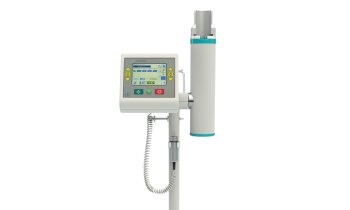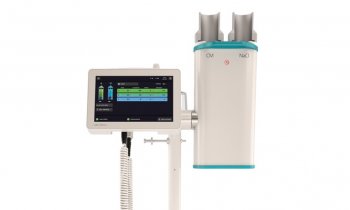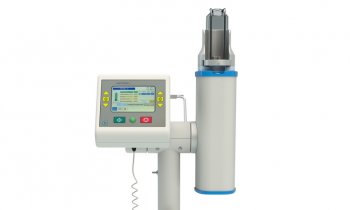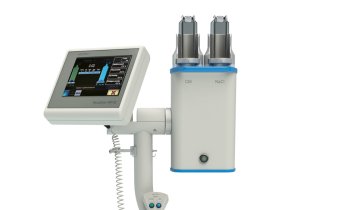Financing a turnkey project in Poland
The Kopernik Angio Centre, which opened last November in Lodz, Poland, is a five million euro turnkey project. In 1998, the radiology department at the Kopernik hospital needed modernisation, but the hospital's owner - the province of Lodz - could not afford such a large investment and, as a public institution, the hospital itself could not seek a financial loan. A way around the problem was found 1999, by Dr Jozef Tazbir, the hospital's director: a limited liability company would be founded, which could raise the capital. As a result, the im Kopernika PPP (PFI) turnkey project was realised by TMSE-OD, in cooperation with the finance company De Lage Landen International B.V. headquartered in Eindhoven, The Netherlands and TMS Sp. Z o.o. representing Toshiba Medical Systems Europe.
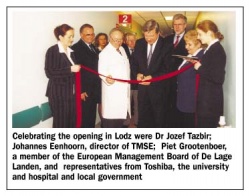
The project included construction, two complete angio systems (Infinix CS-I with FPD and VC-I with FPD), an ultrasound unit (Aplio 80CV incl. Nice), 16 complete CCU beds and a fully computerised department (including a Cardiac PACS). EH spoke with Dr Jozef Tazbir and Henio Sobiscewksi of Toshiba Medical Systems Europe (OD), about the project.In Poland, loans must be requested from a hospital’s owner, which is often the provincial government. For this project, Henio Sobiscewski explained, the bank required a guarantee from the province. ‘The government, however, avoids issuing such a guarantee because it has a negative impact on the public budget.’ The way around this was to found a limited company to outsource the radiology services. ‘The entire radiology department with the exception of oncological radiology, was closed down and the staff was laid off, then immediately hired by the company,’ he explained.
‘One advantage in this is that we can schedule the staff differently and more flexibly,’ Dr Tazbir pointed out. ‘In Poland, there is a law limiting working hours for radiology staff to a maximum of five hours daily. Initially, that was intended to protect staff from radiation. The law applies to all staff - physicians, technical personnel or MTAs - and severely limits work that can be done in a radiology department. The company took the entire personnel on board - but on a freelance basis. So, today, our radiology staff is not permanently employed but provides radiological services as freelancers. This construct allows us to schedule working hours flexibly and according to demand.
The hospital agreed to this arrangement, because that was the only way to raise funds for the radiology department. Due to this concept we can now offer the entire range of imaging procedures. We installed a new CT and an MRI and the ultrasound and endoscopy equipment was upgraded. This first project, which also encompassed a PACS, was completed in 1999.’
Asked whether the negotiations were only possible because Dr Tazbir was administrative director of the Kopernik hospital as well as managing director of the company, he replied: ‘ That is not entirely correct. In my function as administrative director of the hospital I represent the interests of the owners, meaning the province. The hospital holds 86% of the shares of the company, which has its own managing director. The other 14% is mainly in the hands of private owners. That simply happened when the company was founded 16 years ago.’
In terms of financing the project, Henio Sobiscewksi said funds could be raised for two reasons: ‘First, because we had founded the limited company, as explained, then because the hospital has a lot of potential - it has 900 beds, all medical disciplines are represented and it is obvious that the hospital needs a decent diagnostics department. On the basis of the outsourcing and service concept, we could develop a business plan that laid down how much money was needed for what, how many services and what equipment had to be purchased, etc.
This business plan was presented to DVI, an American financial services company, because the Polish banks didn’t want to finance such a project. Dr Tazbir and his colleagues rushed from pillar to post to get the banks to provide the money. DVI was specialised in the healthcare area and it finally took over the financial aspect. The firm looked at the strategic position of the hospital, for example size, specialisations, co-operation with the university, potential for expansion, and location, i.e. Lodz, a city with 1.5 million people and a big catchment area. Those were all factors that influenced DVI’s decision.’
However, a considerable setback occurred when DVI failed and a new investor had to be found. ‘We spoke to many banks in and beyond Poland, but none were interested,’ said Henio Sobiscewksi. De Lage Landen, which was about to position itself in the healthcare market, saw the project as a challenge and took over its next phase.’ Although new in the Polish healthcare market, De Lage Landen quickly analysed the hospital and, within a couple of weeks, a positive decision could be taken on financing the project. ‘The first step was the purchase of a CT,’ he continued. ‘A second project concerned mammography; the third created the technological framework for interventional radiology: two angios and a cardiological ultrasound were installed and an intensive care unit with 16 beds was built.’
This changed the department’s structure: whereas before, patients were returned to a ward with no patient monitoring system, now, after an intervention a patient can remain in the 16-bed ICU overnight to be monitored.
The business plan included the option to admit private patients. ‘Public hospitals in Poland try to admit all patients, including private ones,’ Henio Sobiscewksi explained. ‘Unfortunately, that is only possible when the patient has a contract with a public insurer in addition to this private insurance plan, but even then, he’ll be put on a waiting list. In the Polish healthcare system you cannot just open your wallet and buy any service you want. However, with a company that’s possible.’ In theory, he added, just as a limited company can issue an invoice, so can a public hospital, but that would violate the Polish constitution, which requires that all patients be treated equally.
So, is there a trend towards privatisation in Poland? ‘That’s what the government says it wants. But the future will show what measures politicians will in fact adopt in that respect,’ he replied.
08.08.2006








